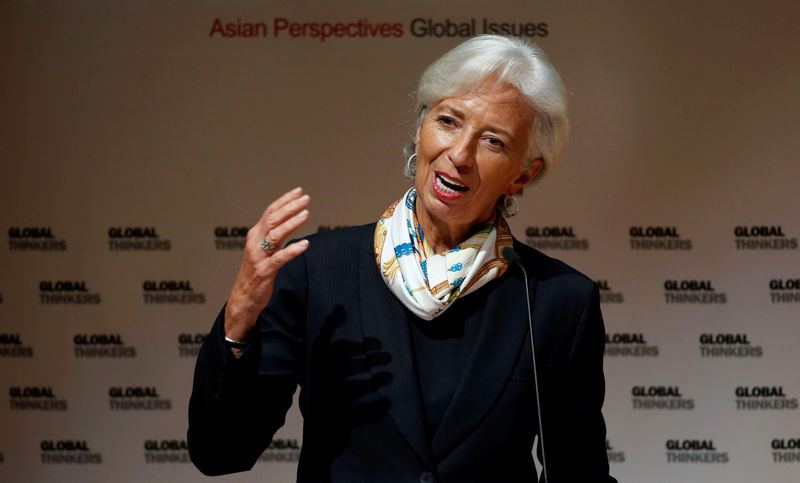(Bloomberg) -- Explore what’s moving the global economy in the new season of the Stephanomics podcast. Subscribe via Apple Podcast, Spotify (NYSE:SPOT) or Pocket Cast.
Christine Lagarde’s inaugural move as European Central Bank president could presage the institution’s first hiatus in policy activism for years.
While ECB officials will keep their ultra-loose stimulus settings -- negative interest rates and monthly bond purchases -- for the foreseeable future, a modest improvement in inflation pressures and a change of leadership have given them space to stop and assess their mission.
The scant details of that review revealed by Lagarde on Thursday, and in a subsequent press release, may be a letdown for watchers of the institution who wanted more. But they also hint that policy makers lack any urgency to share their thinking, while suggesting they’re in no hurry to getting back to tweaking their current monetary stance either.
“I get the sense that until the review is complete, or at least until you have some idea of what’s going to come out of it, it doesn’t make sense to be very activist,” said Peter Dixon, an economist at Commerzbank AG (DE:CBKG).
The ECB isn’t the only central bank to benefit from what is, for now, a relatively benign economic outlook. Many economists including those at Goldman Sachs Group Inc (NYSE:GS). predict most major central banks, including the Federal Reserve, which meets next week, is likely to keep its monetary policy on hold for the rest of the year.
The Fed’s review is almost a year old, with results only planned for later in 2020. The ECB’s reappraisal is the institution’s first in a generation, and the extended pause since the last one in 2003 reflects the degree to which policy makers have been busy firefighting since then.
No sooner had the global financial crisis ebbed than the euro zone’s sovereign debt turmoil struck, followed by years of rate cuts and stimulus salvos as Lagarde’s predecessor, Mario Draghi, struggled to stave off deflation.
Now, having delivered another round of easing in September under Draghi that reactivated quantitative easing, and brought its deposit rate to a record-low minus 0.5%, the ECB finds itself at a juncture.
The biggest change is the advent of Lagarde, who has already brought a shift in style to proceedings and, judging by her two press conferences so far, seems less convinced than her predecessor was of the need to give investors material to trade on every time.
Court Ruling
The ECB also has less ammunition than it used to, giving it cause for caution before attempting more easing. Resorting to more QE, for example, might mean confronting self-imposed limits on the volume of purchases and reopen wounds from a bitter showdown among policy makers last year. The program is particularly disliked by the Bundesbank, and indeed faces a ruling on its legality in Germany’s top court in March.
There are dangers to sitting back though. Nick Kounis, an economist at ABN Amro in Amsterdam, reckons the weakness of inflation pressures are such that the institution can’t afford to pause for long.
“The ECB is still far from bringing inflation to its target and we believe it will act in the next few months,” he said. “I don’t think a central bank like that can close the shop for a year.”
Commerzbank’s Dixon is less convinced. He wonders if the strategy review may turn out to provide a basis for a new approach to policy that could potentially involve eventually dialing down stimulus.
“Kicking off the process itself tells you that this a chance to move in a different direction, so what’s the point of going down the same old road if you decide to change direction at the end of it?” he said. “Certainly one thing that the ECB wants to avoid is ending up like the Bank of Japan, going deeper into buying the market with a very little success.”
Lagarde will have a chance to compare notes with her Japanese counterpart on that point on Friday, when she heads off to the World Economic Forum in Davos, Switzerland. While there, she’ll discuss the global growth outlook with a panel of luminaries including BOJ Governor Haruhiko Kuroda, as well as U.S. Treasury Secretary Steven Mnuchin, and Kristalina Georgieva, her successor as head of the International Monetary Fund.
